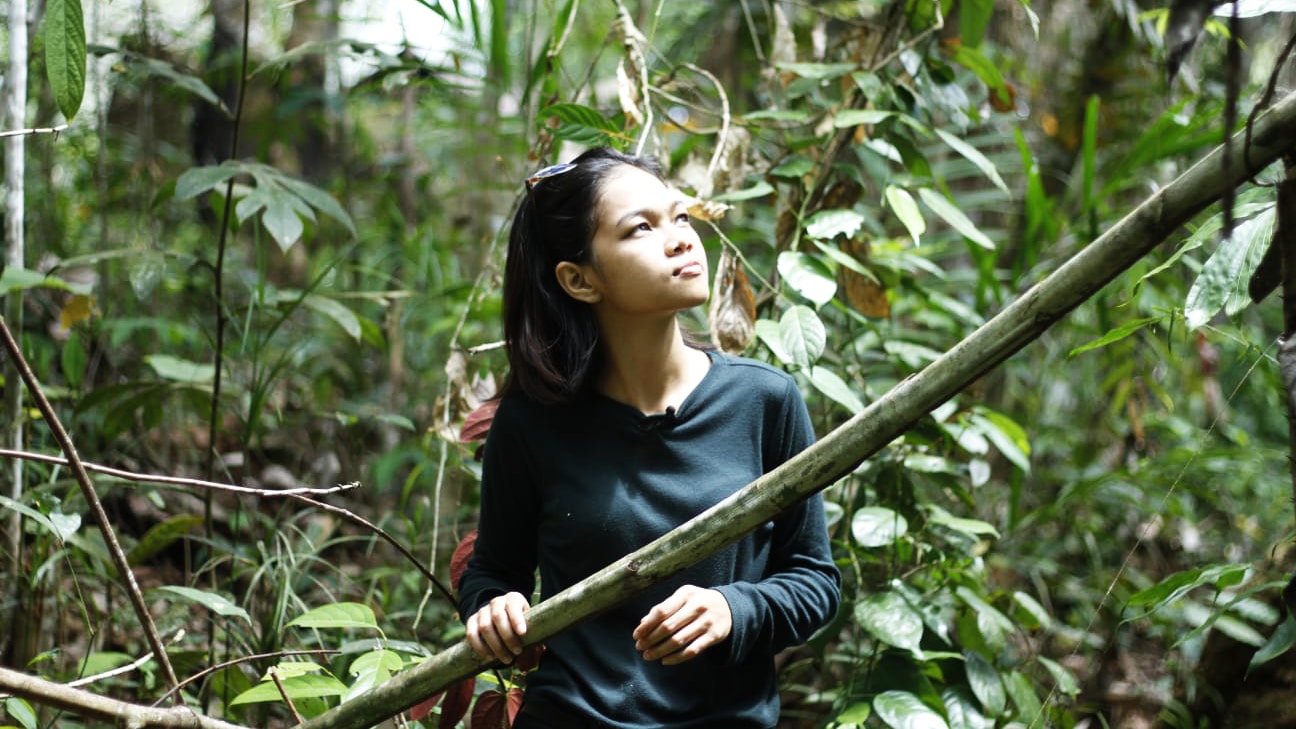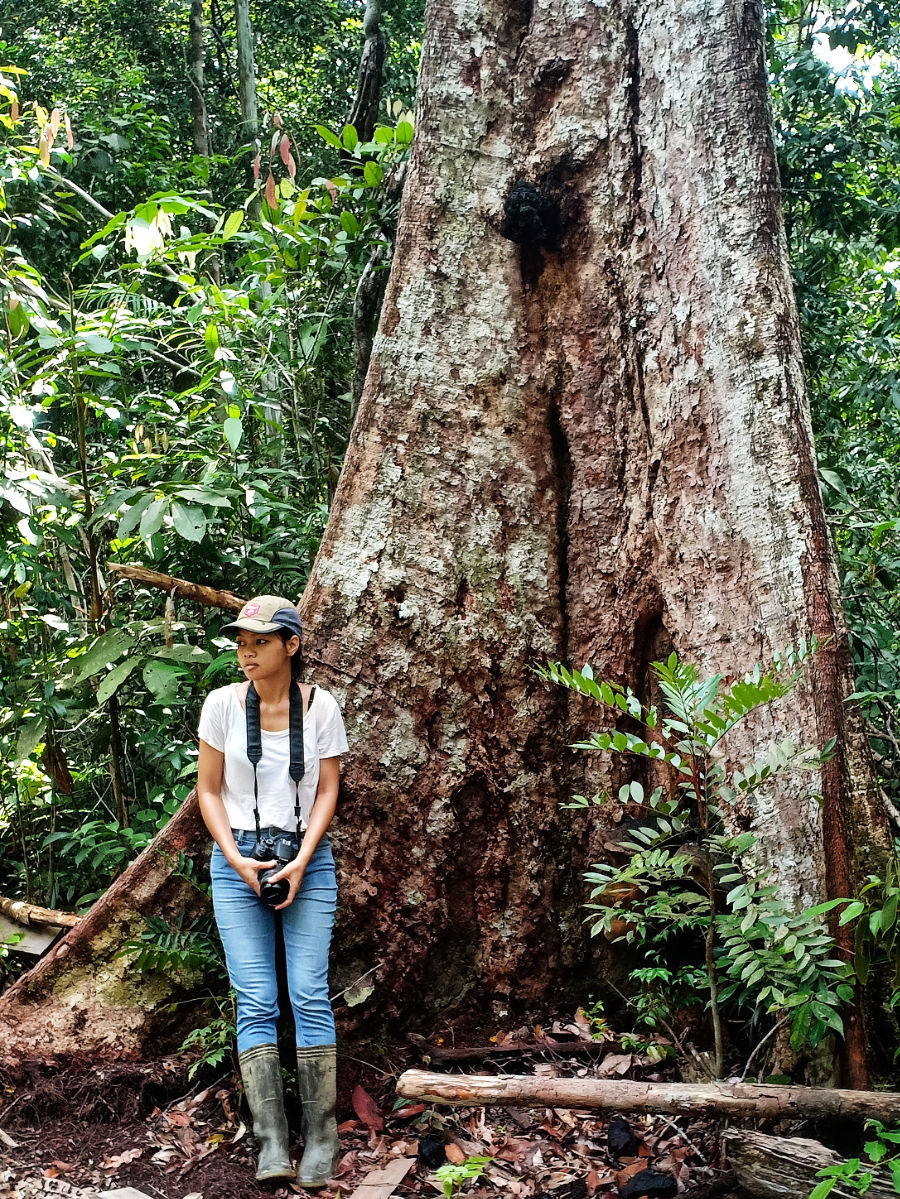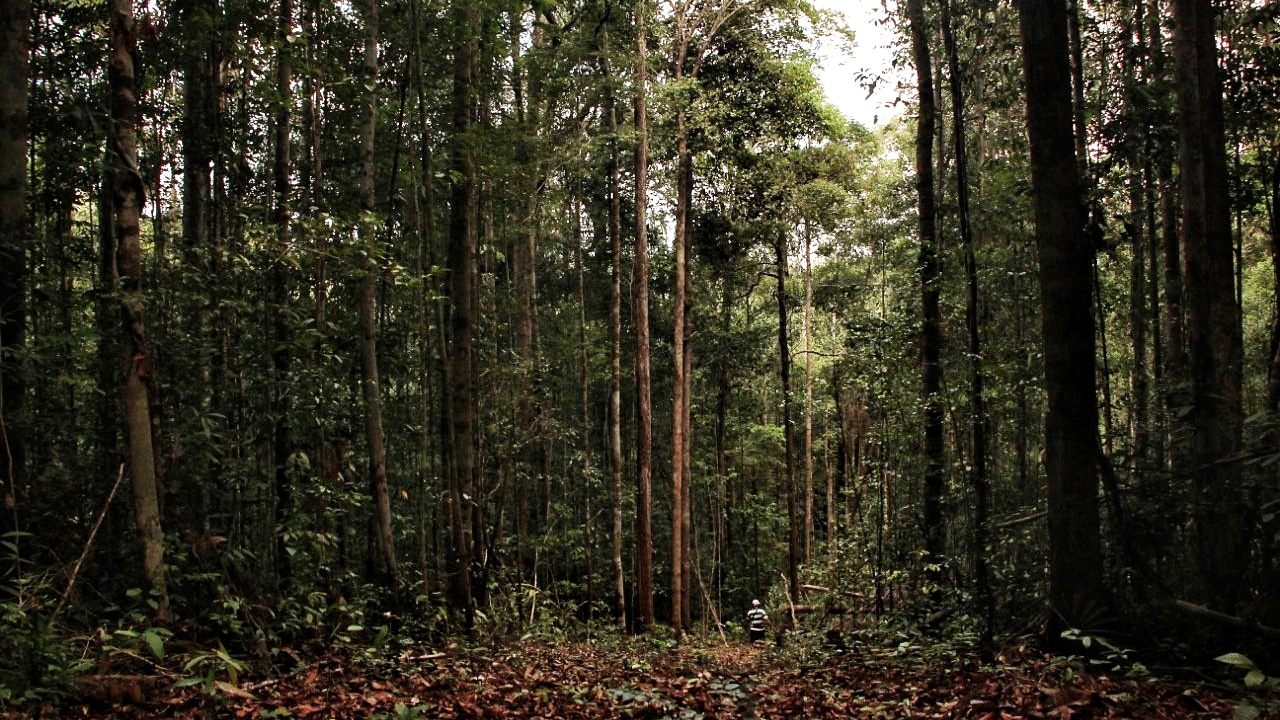
I ran, and ran. My mind was running as well. I couldn’t believe what I had heard. I didn’t want to believe what I had just been told. All the memories came flashing at once, and I got overwhelmed with emotions. As I stepped out into the open, it was as though the world stopped and breathed through me. I was back on my land. I was realigned with my identity.
My name is Monalisa, I was born in a small village called Hurung Bunut in Central Kalimantan, Indonesia. Life was pretty simple when I was a kid. Just like other people in the village, my parents used to go to the forest every morning to tap rubber as their main source of income. Sometimes I joined them, especially during the fruit season! When my parents tapped rubber, I was busy looking for durian, mangosteen, jackfruits, and many other local fruits that I don’t know how to call in English (I am not even sure there are English names for some of them). My mother always carried a rattan bag and picked up some vegetables on the way back home. It felt like we had our own free supermarket.
There was no electricity. Well, some “rich” people could afford a machine, but then the maintenance and operational costs are so high. I remember two neighbors had electricity from 6 pm – 9 pm, and the kids around would come to their house to watch telenovelas. So did my little brother and I. My parents would allow us to go to watch the TV in my neighbor’s house after we worked on our homework. One hour every night, from 7 pm – 8 pm. I tried every trick I could ever imagine to bargain about the time with my mother, but she always won.
In the morning, the kids went to school together and the parents went to the forest to tap rubber or to their garden/ land, where they planted their own rice and vegetables. We are a collective community and you would see that clearly when it comes to working-systems on the land. There is no way you could manage your own rice field by yourself, so what they did is they would work together in one field, then another one and so on, until everyone’s fields were ready to plant. Repeat it for the next step starting from planting to maintaining to harvest. We did it together as a huge family in one village.
There was only an elementary school in my village at that time. So when I graduated, together with my friends, we had to paddle through a big river to go to Junior High School in the village next to us. That was the best childhood memory I have. We would paddle against the river flow in the morning, but then on the way back home, we usually put our stuff inside the boat and we would just hang on with one of the big bamboo sticks that were everywhere beside the river. No paddle, just chill as the current brought us home. I lost my shoes many times, until my mother gave up and stopped buying me new ones. I didn’t mind since all of my friends were in the same situation.
During the first semester at school, my teacher sent a letter asking my parents to meet her at school. My father came and after the meeting, he told me that I needed to move to the city and live with my uncle because my attendance at school was too low. Not a surprise, it was very rare for us to reach school, especially during the fruit season! We prefered to spend time in the forest rather than go to school. Bad kids, but I can’t complain. Still the best childhood memories I could ever ask for.
I moved to the city. Life there is different. It was even hard for me to speak Indonesian (I used to speak the traditional Dayak language at home and at school). I only understood Indonesian in books, but I was not familiar with using it in my daily conversation. That was a hard time for me, definitely. But then I know it was harder for my parents. At that time, they started to work as illegal gold miners, because they needed to cover my education and living costs in the city.
On the occasion of the climate conference in Glasgow, Monalisa speaks together with other "Youth Leaders" about the challenge of climate change.
Sometimes, my father would pick me up, usually at Christmas and bring me back home for the holidays. That’s how I started to see the development in my village. The government started to open the road access (before that, the river is the only access we had). I remember every time I was back for holiday, I saw more development in my village and I knew everyone was very happy about it. Now we had the road, electricity, they even built a Junior High School in my village.
Later on, I knew those infrastructures are the key to bring investment to our area. Big companies were coming, approaching the people, nice in dress, looking polished and smart, then offered to buy their land. For the villagers, this was a new concept. We didn’t know how to put “value” on our land in monetary terms. So we had no clue and took it for a good sign. The companies offered “big money” and as you can imagine, those people with no education, no concept of economy, were happy to sell their land because “some people from the city” told them the “value” of their land is based on the money they offered.
… and everything just flipped on its head. Super quickly. I am not even 30 years old, but now, the kids are busy playing with their smartphones in the village because they have internet access now. The price of rattan and rubber, as many other non-timber forest products are getting so low, that selling your land to the companies seems like the only option you have. Gold mining is basically gambling. We have no technology to detect what is inside the river or the land, so if you want to open a mining unit, you need to invest a lot of money and if you are lucky, you will get a lot back and if not, you will lose everything.
I consider myself as a lucky person, because I am one of very few people from the village who got a chance to go to the university. My parents sent me and my siblings to good universities in Java. They did that by selling their land and work as illegal gold miners, because again, that is the only way they could afford it.
I spent 5 years in Java and Bali. I worked in Bali for a year till I decided to come back to my home town in Kalimantan. I went back home after a few years away and what I see in my village is completely heartbreaking. I have seen it before, but it has gotten worse. Now I realize that by losing the forest, we also lose our identity. We tried to follow this modern lifestyle by selling whatever we have, we get money and start consuming. The people in my village own cars, motorbikes, and build ugly concrete houses! Because we think wooden or bamboo houses are not modern. Jesus Christ! We have zero knowledge on concrete buildings so the houses are genuinely ugly, there is no proper lighting and air in the house. The kids are busy playing with their smartphones and the parents are totally okay with that. Now I don’t even know what to think about development.. It is so scary. It took away our forest, it took away our life.
Now we have not many options.. My parents, just like the other people in the village now are dependent on illegal gold mines even though they don’t have to pay for our education anymore. They just have no other option. Some people choose illegal logging. Same craziness. Same destruction. Risking their life everyday with chemicals and/ or logging activities hoping the police will not catch them because then if they do not have enough money to bribe the police, they need to stay in prison for a period of time, leaving their families to suffer.
I joined Fairventures Worldwide in the beginning of 2018, 3 months after I decided to come back from Bali. I heard about the 1 Million Trees project before, and I really like the idea behind it. I was curious about this organization and seemed like the universe led me here. I met one of the team members. We became good friends and one day he mentioned that FVW is looking for a Communications Assistant. Perfect with my education background, I applied and here I am until today.
Fairventures gives me a chance to get to understand the situation in my hometown better. I met amazing people with various backgrounds here. Economy, Anthropology, Architecture, Forestry, Education, Politics and many more! I also got a chance to spend more time with the community in the village. Getting the perspective from outsiders gives me a bigger picture of what is happening and a deeper understanding of how complicated the situation is. While at the same time, trying our best to create a solution. Improving and learning, together with the community. I put in my whole energy and heart to our work since the first day I joined this organization, until a few months ago something hit me so hard.
I was spending a usual weekend back in my village to visit my mother in February 2020. Before Covid-19 put us in an even weirder situation. As usual, I try to spend as much time as I can to reconnect with the people I grew up with. Try to see their perspective because it doesn’t matter how the destruction broke my heart… I am just a young person with enough education background which gives me the option of what kind of life I want to have. Where I want to live and how I will do it. I have that luxury that they dodn’t.
That’s when someone mentioned a wood processing company that will cut the trees in the last forest we have in the village. I can feel the waterfalls coming from my eyes when I heard this.
I tried to find more information about it, I met the landowners and few of them said they already signed a contract with the wood processing company and they will cut the trees soon. They even have no criteria of what kind of trees they will cut because everything could work, they just need to put it in a giant machine and all the trees can make money for the company. The landowners told me with a smile on his face. He said “isn’t it good, a company will buy the timber, not the land, and we don’t have to do anything. They even build their own road for transportation to the forest”. Again, my heart stopped beating for a while. I don’t even know how to respond to the landowners. They mentioned how hard it is to make money. So what just happened is a “blessing” for them.
I asked one of the land owners to bring me to the forest, I said “I want to see it before it’s gone”. He looked at me confused. But he went there with me anyway. The first time we enter the forest, I can suddenly feel the temperature difference. The fresh air and the sound of the forest is just… magical. It is so calm.
I walked inside the forest and sometimes I sat down, and just closed my eyes. All of the emotions were very strong.. I really can’t imagine being back here and there are no trees anymore. My heart is completely broken now. Before I went back home, I took a few pictures with my camera, and left my heart pieces there in the last forest.
About the author: I do Public Relations for Fairventures Worldwide, a non-profit organization that works with my community and others in Central Kalimantan to defend local land rights and reforest degraded land. The revitalized soil can be used by local farmers to plant trees and food crops with which they can generate a local income for themselves whilst protecting the rainforest. Visit our website to find out more about our work. We would be thrilled about a donation.
No one can give me a verified size of the remaining forest, someone mentioned something around 200 hectares. This last forest is the buffer zone between a mega palm oil plantation and the village.


